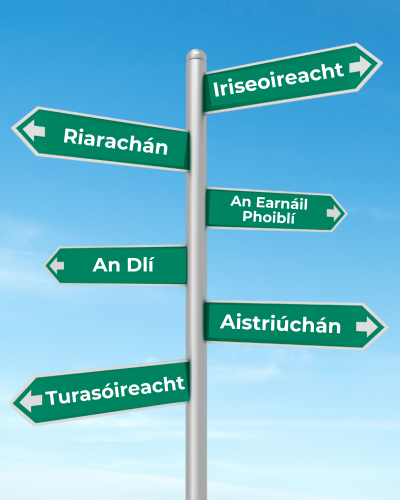Unique Baby Names in Irish for Girls
Choosing a unique baby name can be challenging for parents. If you are on the search for a name that won’t be shared by every child in the primary school, here’s a list we’ve compiled of 30 Irish names for your little girl as well as their meanings and origins!

Aifric
The name Aifric possibly comes from the Old Irish word for Africa, Afraicc, or it could possibly come from Aithbhreac, the Scots Gaelic name meaning ‘very freckled’.
Aodhamair
The female variant of Aodh, Aodhamair means ‘little fire’.
Béibhinn
Béibhinn comes from two Old Irish words, ‘bé’, meaning woman, and ‘finn’, meaning fair or blonde, hence the full meaning of the name Béibhinn is ‘fair woman’. The name Béibhinn is used to Gaelicise Vivian or Vivenne.
Cadhla
The Irish name Cadhla means ‘beautiful’.Ciannait
A female variant of the name Cian, Ciannait means ‘steadfast queen’.
Damhnait
Deriving from the old name Damnat, Damhnait means ‘little doe’.
Dianaimh
Originating from the Old Irish ‘díainim’, Dianaimh means ‘clean’ or ‘without blemish’.
Eithne
Eithne possibly derives from the Irish ‘eithne’, meaning ‘kernel’.
Étaín
Étaín is believed to have originated from the Old Irish word ‘ét’, which gives us Modern Irish ‘éad’ (‘jealousy’). Another spelling variant is Étáin.
Fainche
From the Irish word ‘fuinche’, meaning ‘claw’ or ‘hoof’, the name Fainche is commonly seen in Irish mythology.
Fiadh
It is thought that the name Fiadh originates from the words ‘fia’, meaning ‘deer’, or ‘fiáin’, meaning ‘wild’.
Gobnait
The female variant of the name Gobán, this name derives from the Old Irish word ‘gobae’, meaning ‘smith’.
Gormflaith
Gormflaith means ‘illustrious queen’.
Íde
A modernised variant of the Old Irish name ‘Íte’, Íde possibly derives from the Old Irish ‘ítu’, meaning ‘thirst’.
Iúile
Iúile originates from the Roman name Julius, meaning ‘devoted to the god Jupiter’. The English name Julia can be Gaelicised as Iúile.
Léan
Léan originates from the Greek name Helene, meaning ‘light’. Another variant of the name is Léana. The names Helen and Helena are Gaelicised as Léan.
Líadan
Líadan possibly means ‘little grey one’.
Luíseach
This is a modernised form of the Old Irish name Luigsech and is possibly connected with the god Lugh from the Tuatha Dé Danann.
Muadhnait
Deriving from the Old Irish ‘muad’, meaning ‘noble’, Muadhnait means ‘noble queen’. The name Muadnait can be used to Gaelicise the name Mona.
Muirgheal
Muirgheal is a compound word of the two Irish words, ‘muir’, meaning ‘sea’, and ‘geal’ meaning ‘bright’. Other spelling variants include Muireall and Muirgel. Muirgheal is used to Gaelicise the names Muriel and Meryl.
Muirne
Muirne originates from the Old Irish ‘muirn’, meaning ‘affection’ or ‘exuberance’. Muirne is the name of Fionn Mac Cumhaill’s mother in the Fenian Cycle.
Neasa
Neasa is the name of the mother of Conchobhar Mac Neasa, the king of Ulster in the Ulster Cycle. The name Neasa can be used to Gaelicise the names Nessa or Vanessa.
Odharnait
Like the male variant ‘Odhrán’, this name originates from the Old Irish ‘odar’ to describe a greyish brown or tan colour and means ‘little tanned one’.
Radhnait
Radhnait comes from the Old Irish word ‘rath’, meaning ‘grace’ or ‘prosperity’.
Ríona
The name Ríona derives from the word ‘banríon’, meaning ‘queen’. Other variants of the name are Ríoghnach and Ríonach.
Saorfhlaith
Saorfhlaith is a compound word that comes from the word ‘saor’, meaning ‘free’, and ‘flaith’, meaning ‘sovereignty’, and the name means ‘noble princess’. Other variants of the name include Saorla and Saorlaith.
Sadhb
Sadhb means ‘sweet’. Sadhb is the name of the mother of Oisín, Fionn Mac Cumhaill’s son.
Saraid
The name of Conn of The Hundred Battles’ daughter in Irish mythology, Saraid comes from the word ‘sár’, meaning ‘excellent’. Another variant of the name is Sárait.
Síofra
Síofra means ‘elf’ or ‘sprite’.
Síomha
Síomha is a compound word that derives from the Old Irish word ‘síd’, meaning ‘peace’ or ‘fairy mound’, and ‘maith’, meaning ‘good’. Another spelling variant is Síthmaith.
If you have an interest in all things folklore, Gaelchultúr has folklore courses for fluent speakers and for beginners starting soon. From pre-Christian traditions to the art of storytelling, superstitions to the dark underworld, these courses discuss some of the most fascinating elements of Gaelic folklore. You can learn more or register your place on a cultural course with us at Gaelchultur.com


